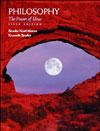| Albert Camus | A French existentialist writer, emphasized the absurdity of the world and the inability of the individual to meet genuine human needs within it.
|
 |
 |
 |
| A priori principle | A proposition whose truth we do not need to know through sensory experience and that no conceivable experience could serve to refute.
|
 |
 |
 |
| Authenticity | A way of understanding the essential nature of the human being by seeing it as a totality.
|
 |
 |
 |
| Bad faith | In the philosophy of Jean-Paul Sartre, essential self-deception or lying to oneself, especially when this takes the form of blaming circumstances for one's fate and not seizing the freedom to realize oneself in action.
|
 |
 |
 |
| Continental philosophy | The philosophical traditions of continental Europe; includes phenomenology, existentialism, hermeneutics, deconstruction, and critical theory.
|
 |
 |
 |
| Edmund Husserl | The first great phenomenologist.
|
 |
 |
 |
| Eternal law | In the philosophy of Thomas Aquinas, the divine reason of God that rules over all things at all times.
|
 |
 |
 |
| Existentialism | A tradition of twentieth-century philosophy having its roots in the nineteenth century but coming to flower in Europe after World War II; of central concern is the question of how the individual is to find an authentic existence in this world, in which there is no ultimate reason why things happen one way and not another.
|
 |
 |
 |
| Friedrich Nietzsche | Also reacted strongly against Hegelian idealism; he anticipated important themes of existentialism.
|
 |
 |
 |
| Jean-Paul Sartre | A French existentialist writer, emphasized the significance of abandonment and its implications.
|
 |
 |
 |
| Martin Heidegger | Emphasized the importance of returning to Being itself independent of the mental categories we assign to it.
|
 |
 |
 |
| Nihilism | The rejection of values and beliefs.
|
 |
 |
 |
| Phenomena | Things as they appear to us or, alternatively, the appearances themselves.
|
 |
 |
 |
| Phenomenologocial reduction | A method of putting aside the ordinary attitude toward the world and its objects in order to See the objects of pure consciousness through intuition.
|
 |
 |
 |
| Phenomenology | A tradition of twentieth-century Continental philosophy based on the phenomenological method, which seeks rigorous knowledge not of things-in-themselves but rather of the structures of consciousness and of things as they appear to consciousness.
|
 |
 |
 |
| Soren Kierkegaard | A nineteenth-century philosopher, rejected the Hegelian idea of a rational universe and anticipated some of the themes of existentialism.
|
 |
 |
 |
| Transcendental phenomenology | An epistemological method that seeks the certainty of a pure consciousness of objects in the transcendental ego.
|
 |
 |
 |
| Universal phenomenology of consciousness | Attempts made by Hegel and Husserl to devise a pure science of knowing.
|



 2002 McGraw-Hill Higher Education
2002 McGraw-Hill Higher Education